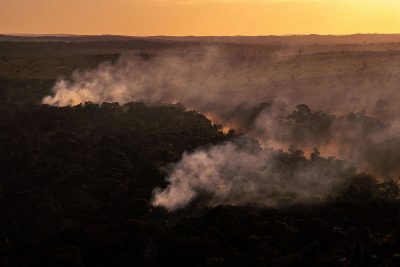Fires Are Raging in the Amazon—Again

One year has passed since the world was shocked by the images of the fires blazing across the Amazon in Brazil. But since then, the forest hasn’t stopped burning —and 2020 could be even more devastating for the rainforest and the Indigenous Peoples who call it home. Last week, Greenpeace Brazil flew over the state of Mato Grosso to capture images of the Amazon. Even though the government had ordered a ban on forest fires in the state starting at the beginning of July, the photos show smoke, flames, and just how ineffective the ban has been.
Last year, more than 1 million hectares of forest were burned, and the trend shows the destruction is far from over. Last June, more than two thousand fire hotspots were registered in the Amazon, the highest number in the last thirteen years. Since Brazil’s President Bolsonaro took office in January 2019, his government’s agenda has been very clear: dismantle environmental protection law and agencies, so that forest destroyers can burn the forest freely, clearing the land to turn it into pastures, without being held accountable.
The consequences of this destruction are dire. From Siberia to the Amazon, fires are raging across the world. Losing our forests means losing the fight against the climate crisis, putting biodiversity at risk of extinction, and threatening the lives of Indigenous Peoples who depend on the forest standing for their survival. Fighting to protect the forest and Indigenous lands from fires and deforestation become even more difficult—and crucial —during a pandemic.

In 2019, the images of the fires raging in the Amazon went viral and shocked the world. © Victor Moriyama / Greenpeace
With a mortality rate from COVID-19 150% higher than the Brazilian average, Indigenous Peoples are already more vulnerable during the pandemic. The smoke from the fires will put their respiratory system at even higher risk during a time when access to healthcare is limited in remote areas in the Amazon.
But things can be different. After the public’s outcry last year, there is increasing pressure on Brazil’s government. Investors, companies and governments have been signaling their concerns about the destruction of the forest and its impact on the environment, and their message is clear: they don’t want to do business with forest destroyers. Even though last week Bolsonaro announced a “fire moratorium” for 120 days, the images of Mato Grosso show how his measures have been performative and inefficient.

With 4,437 hotspots, the state of Mato Grosso has had the highest number of fires in the Brazilian Amazon this year. © Christian Braga / Greenpeace
To properly protect the forest and its Peoples, the Brazilian government must properly fund environmental agencies, reinforce environmental laws and protect the rights of Indigenous Peoples. The exploitation of nature and people is a major cause of the current health, climate and biodiversity crises.
We must demand governments and companies end business with forest destroyers and invest and support resilient economies that put nature and people first.
*
Note to readers: please click the share buttons above or below. Forward this article to your email lists. Crosspost on your blog site, internet forums. etc.
Diego Gonzaga is a content editor for Greenpeace International based in San Francisco, US.
Featured image: Between 7-10 July, Greenpeace Brazil flew over the state of Mato Grosso to capture images of fires burning in the Amazon © Christian Braga / Greenpeace

